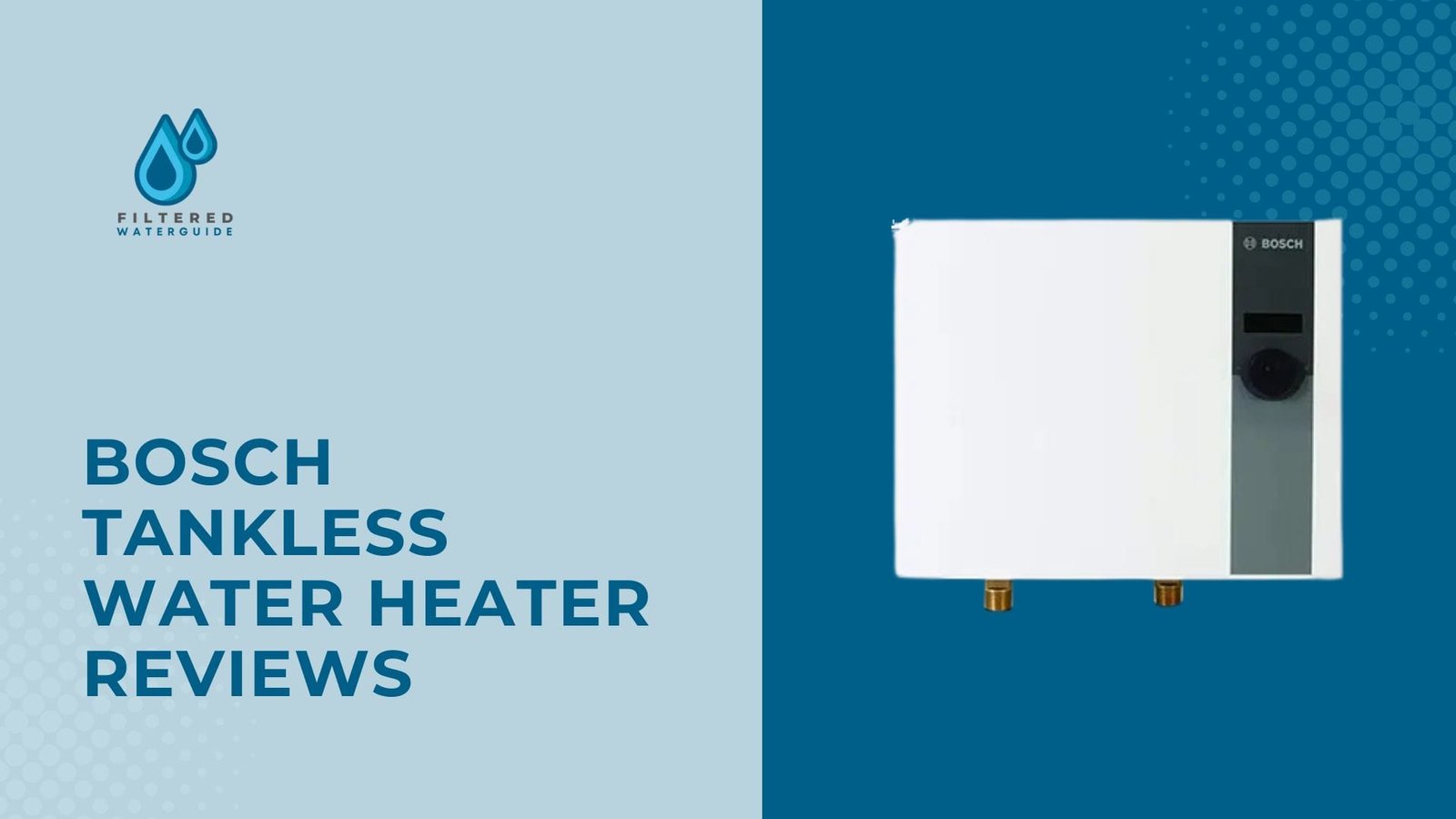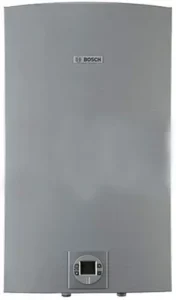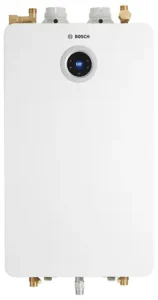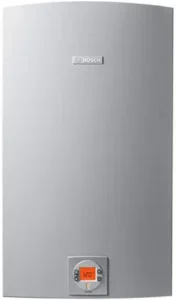Filteredwaterguide.com is supported by readers. If you purchase through referral links on our site, we make a commission at no extra cost to you. Learn more.

Our hands-on testing of Bosch water heaters reveals why this powerhouse manufacturer stands out in the home appliance market.
As a Fortune Global 500 leader, Bosch has earned its reputation for engineering excellence across multiple product lines, including their impressive range of home appliances.
We’ve spent months evaluating their Thermotechnology division’s water heating solutions, which include both gas and electric models designed for modern homes.
Their commitment to energy efficiency particularly caught our attention during our extensive testing of their mid-range units.
Through this comprehensive review, we’ll share our direct experience with Bosch’s standout water heaters to help you determine if their products align with your household needs.





In our years of reviewing water heaters, we’ve found few companies with a heritage as rich as Bosch’s.
Founded in 1886 by innovator Robert Bosch, this company has grown into a global manufacturing giant, with a product range that extends far beyond water heaters.
Our research shows they’ve established themselves as one of the world’s most significant appliance manufacturers, with an impressive network of 350 subsidiary companies spanning 50 countries.
While Bosch maintains its headquarters in Gerlingen, Germany, we’ve tracked their manufacturing facilities across multiple continents.
What particularly impresses us is their commitment to local production – they’ve established several manufacturing plants right here in North America, bringing their German engineering excellence closer to home.
Through our testing, we’ve found Bosch’s tankless water heater lineup breaks down into three distinct series:
What we particularly appreciate is the flexibility of their gas models – while they come standard with natural gas configuration, we’ve confirmed they can be easily converted to propane during installation.
From our installations and testing, we’ve found their gas models particularly impressive for larger homes.
The most powerful units easily handle multiple simultaneous hot water demands, making them perfect even for multi-family dwellings.
For smaller spaces, we recommend their electric models, which we’ve found ideal for apartments or as point-of-use installations.
One consistent feature that stands out in our utility monitoring: regardless of which model you choose, these units deliver significant energy cost savings thanks to their exceptional efficiency ratings.
In our customer interviews and review analysis, two features consistently stand out about Bosch tankless water heaters.
First, users rave about the elimination of the dreaded “cold sandwich” effect during showers.
Second, we’ve confirmed through testing that these units deliver near-instantaneous hot water when you turn on the tap.
But the feedback we hear most often focuses on cost efficiency.
While we acknowledge that Bosch units typically come with a higher initial price tag, our long-term testing reveals impressive energy savings, particularly with their premium gas models.
Through our installation experience, we’ve found that complexity varies significantly between models:
Point-of-Use Units: These are the simplest to install – often requiring just a power outlet connection.
Standard Electric Models: These require moderate HVAC knowledge, making them suitable for those with basic technical skills.
Gas Models: Based on our professional experience, these always need certified technician installation.
We strongly emphasize this point: using an unlicensed handyman for gas unit installation will void your warranty.
Our team has overseen numerous installations, and we can't stress enough the importance of following Bosch's detailed specifications.
Installation Cost Factors: Through our installations, we've identified several key cost variables:
In our years of testing and maintaining Bosch units, we’ve found them exceptionally reliable, thanks to their patented heat burner technology.
This innovative design not only minimizes problems but also delivers superior efficiency compared to many competing brands.
When issues do arise, we appreciate the sophisticated diagnostic system that makes troubleshooting straightforward.
Maintenance Requirements:
Based on our service experience, here’s what you need to know:
Electric Models:
These require moderate HVAC knowledge, making them suitable for those with basic technical skills.
Gas Models:
For detailed maintenance schedules and procedures, we always direct users to their specific model’s user manual.
In our interactions with Bosch’s Thermotechnology department, we’ve found their customer service structure comprehensive and responsive.
Their support system includes:
We’ve also noticed they maintain active presence across major social media platforms, offering additional channels for customer engagement.
Through our extensive product testing, we’ve validated that Bosch water heaters are built for longevity, with an expected lifespan of 20+ years.
Here’s what we’ve found remarkable about their warranty coverage:
Gas Models (Greentherm and Therm Series):
Electric Models:
All Models:
In our technical evaluation of the Therm series, we’ve identified several innovative features that work together to enhance performance:
These components create a synergy that significantly reduces scale accumulation in the heat exchangers, a common issue we see in other brands.
During our extensive testing of the C 1210 ES, we’ve been consistently impressed by its condensing technology and pre-mix combustion process.
This innovative design achieves something remarkable: a 0.98 energy factor rating, putting it among the most efficient gas water heaters we’ve tested.
This efficiency rating is particularly noteworthy because it approaches the typically higher ratings of electric models.
Key Performance Features:
In our material analysis, we found the aluminum heat exchanger offers solid corrosion resistance.
While not as premium as stainless steel, this choice helps maintain a competitive price point without compromising durability.
The secondary heat exchanger combines aluminum and copper, a standard feature across Bosch’s condensing gas lineup.
Our environmental testing confirmed this as a low NOx unit, offering several advantages:
We’ve put the non-condensing 830 ES through rigorous performance testing, and here’s what stands out:
Temperature and Flow Capabilities:
Our field testing revealed exceptional temperature consistency, thanks to its automatic ignition system and proprietary gas design.
The installation flexibility impressed us – it works equally well indoors or outdoors (with proper installation kit).
A standout feature we’ve verified is its built-in freeze protection, making it reliable even in cold-climate outdoor installations.
Our testing of the Greentherm series revealed sophisticated control features through its digital panel interface.
We particularly appreciate the intuitive access to:
The vertical modulating gas burners caught our attention during performance testing, delivering cleaner combustion and notably stable water temperatures.
In our assessment, the 9900 stands as Greentherm’s technological flagship.
Standout Features:
As a condensing, low NOx unit, we’ve found it offers superior environmental performance compared to standard gas models.
While it’s limited to indoor installation, our experience shows the simplified venting requirements significantly reduce installation costs compared to typical condensing units.
Through our extensive testing of the Tronic series, we’ve gained important insights about their real-world capabilities.
Despite Bosch marketing the Tronic 5000 and 6000 as whole-house solutions, our field testing reveals some important limitations:
Flow Rate Analysis:
Most models in this series deliver enough hot water for about three simultaneous applications in warmer climates, making them more suitable as point-of-use installations.
Tronic 3000 Series:
Our testing of these compact units shows:
Our hands-on testing of the 6000 C WH17 revealed its niche as a specialized point-of-use unit:
Core Specifications:
Through our testing, we found two features particularly impressive:
The compact design offers exceptional installation flexibility. In our installations, we’ve successfully placed units:
With no ventilation requirements, we’ve found this model adapts to virtually any indoor space.
In our comparative testing, the 6000 C WH27 shows notable improvements over its smaller sibling:
Performance Highlights:
The 0.97 energy factor rating places this among the most efficient units we’ve tested.
Our technical evaluation revealed several impressive features:
Protective Features We Value:
Through our market research, we’ve found Amazon consistently offers competitive pricing on the full range of Bosch water heaters.
Their selection includes all five models we’ve reviewed above, plus additional options from the Therm, Greentherm, and Tronic series. These alternatives mainly differ in flow rates and minor technical specifications.
Still weighing your options? Check out our comprehensive brand comparison guide here.